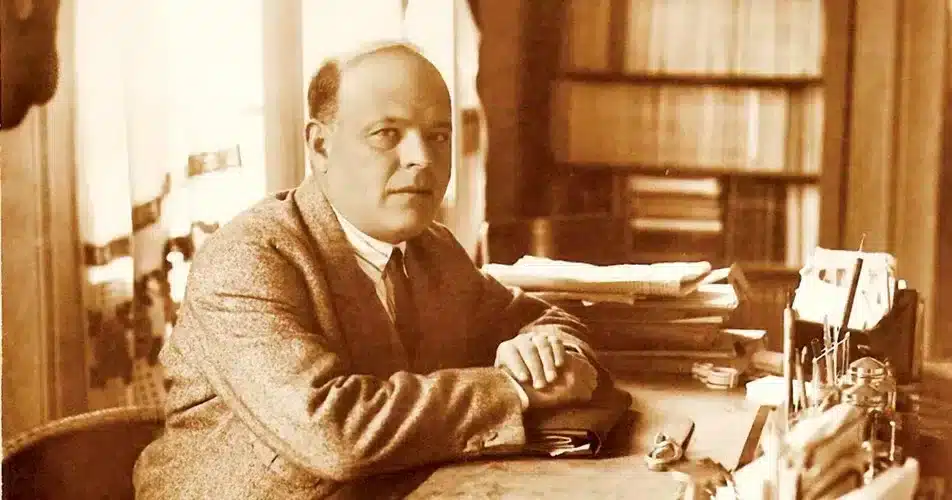Exploring the Life and Works of Haim Nachman Bialik

Image Courtesy: https://ukrainianjewishencounter.org/
Haim Nachman Bialik (9 January 1873 – 4 July 1934) was a Jewish poet who wrote primarily in Hebrew but also in Yiddish. Bialik was one of the pioneers of modern Hebrew poetry. He was part of the vanguard of Jewish thinkers who gave voice to the breath of new life in Jewish life.
Early Life And Education
Haim Nachman Bialik, a luminary in Hebrew and Yiddish poetry, was born on January 9, 1873, in Radi, Volhynia, then part of the Russian Empire. His early life was marked by hardship; he was orphaned at a young age and raised by his grandfather, who provided him with a traditional Jewish education. Despite these challenges, Bialik’s intellectual curiosity flourished. He attended the Volozhin Yeshiva, a prestigious Jewish academy, albeit briefly, where he was exposed to the Haskala, or Jewish Enlightenment movement. This exposure significantly influenced his worldview and later writings. Bialik’s educational journey continued in Odessa, a hub of Jewish intellectualism, where he delved into European literature and languages, further shaping his literary career.
Career And Achievements
Haim Nachman Bialik literary journey began with his first published poem, “El Hatzipor,” which yearned for Zion. This marked the start of his profound influence on Hebrew literature. Bialik’s “golden period” started in 1900, during which he published his first collection of poetry in Warsaw to critical acclaim, earning him the title of “the poet of national Renaissance”. His works, including the poignant “HaMatmid,” written in 1898, reflect his ambivalence towards the yeshiva life, juxtaposing admiration for the students’ dedication with a critique of their insular world. Bialik’s contributions were not limited to poetry; he was also a noted essayist, storyteller, and translator, bringing major European works into Hebrew and Yiddish. His impact extended beyond literature into the Zionist movement, where he was an active participant. Bialik’s legacy is cemented by his powerful responses to the Kishinyov pogrom of 1903, with poems like “Be-ʿĭr he-haregah” (“In the City of Slaughter”), which expressed the anguish and resilience of the Jewish people. His death on July 4, 1934, in Vienna, Austria, marked the end of an era, but his works continue to inspire and resonate with readers worldwide.
Notable Events And Milestones
Haim Nachman Bialik early hardship, coupled with his upbringing by a pious grandfather, deeply influenced his later works. His education in Jewish religious classics at the Jewish academy in Volozhin and his subsequent drift from yeshiva life due to the Haskala movement were pivotal in his development as a writer. Bialik’s move to Odessa in 1891 marked the beginning of his association with Jewish modernism and his lifelong friendship with Aḥad Haʿam, who encouraged his creative writing. The publication of “Ha-matmid” (“The Diligent Talmud Student”) in Ha-shiloaḥ established Bialik as a preeminent Hebrew poet. His response to the Kishinyov pogrom in 1903 with poems like “Be-ʿĭr he-haregah” (“In the City of Slaughter”) showcased his ability to capture the collective anguish and yearnings of the Jewish people.
Bialik’s contributions to society and culture are manifold. He is credited with revitalizing modern Hebrew poetry, infusing it with romantic tropes, intense introspection, and modernist language treatment. His works, which include “Metey midbar” (“The Dead of the Desert”) and “Ha-brekha” (“The Pool”), are celebrated for their emotional depth and rich imagery. His translations of major European works into Hebrew and Yiddish further underscore his role in the cultural renaissance of his time. Moreover, Bialik’s impact extended beyond literature. His poems inspired Jewish self-defense groups in the Russian Empire and later the Haganah in Palestine, reflecting his influence on the Zionist movement. His legacy as Israel’s national poet and a voice of the Jewish Renaissance endures, with his poetry widely translated and anthologized, continuing to inspire and resonate with readers around the world.
Awards And Honors
- Haim Nachman Bialik is recognized as Israel’s national poet.
- His contributions to Hebrew literature and the Jewish Renaissance have been widely acknowledged.
- Although specific awards and honors are not detailed in the search results, his legacy is celebrated through various cultural references and his influence on modern Hebrew poetry.
- Bialik’s work inspired the Zionist movement and he is still celebrated in Israel today.
- His poetry, known for its emotional depth and rich imagery, has been translated and anthologized globally.
- On 9 January 2014, Google Doodle celebrated Haim Nachman Bialik’s 141st Birthday.
Additional Resources
Books:
- “C.N. Bialik: Selected Poems” translated by David Aberbach offers a collection of Bialik’s poetry.
- “Random Harvest & Other Novellas” presents a selection of Bialik’s shorter works.
- “Revealment and Concealment: Five Essays” provides insight into Bialik’s thoughts on literature and Jewish identity.
- Avner Holtzman’s “Hayim Nahman Bialik: Poet of Hebrew” is an extensive research on Bialik’s life and works.
Documentaries:
- “Bialik: King of the Jews” is an Israeli documentary that explores the life and legacy of Bialik, featuring animation and narration by Chaim Topol.
- The documentary provides a comprehensive look at Bialik’s influence on Israeli culture and his status as a national poet.
Museums:
- Bet Bialik Museum in Tel Aviv is dedicated to the life and works of Bialik, showcasing his writings and personal items.
- The museum offers a glimpse into the poet’s life and the early years of Tel Aviv.
Observer Voice is the one stop site for National, International news, Sports, Editor’s Choice, Art/culture contents, Quotes and much more. We also cover historical contents. Historical contents includes World History, Indian History, and what happened today. The website also covers Entertainment across the India and World.
Follow Us on Twitter, Instagram, Facebook, & LinkedIn

